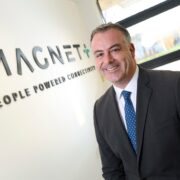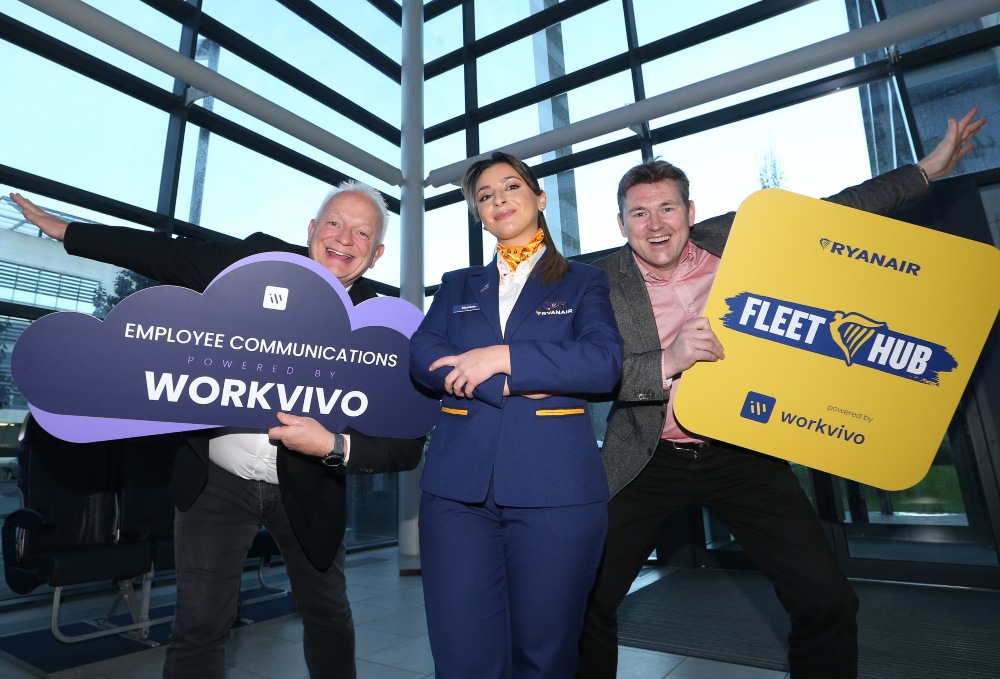Podcast Ep 155: PepTalk co-founder James Brogan on how the business is scaling to the US by changing the world of work as we know it.
Combining behavioural psychology with academic research, the PepTalk platform led by cousins James and Bernard Brogan is now used by 50,000 employees in blue chip businesses on four continents. The cousins are also the co-founders of Legacy Sports and Entertainment.
In our latest ThinkBusiness Podcast, James Brogan talks about the Irish company’s move into the US market after raising $3.6m in a funding round led by Venture Wave Capital.
“It’s about employee engagement. It’s about helping managers understand teams better and more importantly, do something about the issues as they emerge”
The funding will be used to scale the company in the US with CEO, James Brogan relocating to PepTalk’s newly opened New York office to serve an increasing market demand amongst North American customers.
PepTalk currently has 23 full-time employees, with offices in Dublin, London, and now the new office in New York City. The company expects to double growth over the next 12 months and hire 12 additional members across sales, marketing, and technology.
Teaming up with 50,000 users on four continents
The software company has experienced strong growth in recent years, reaching over 50,000 employees across four continents and winning the addition of a significant number of global multi-year partnerships with blue chip clients including Verizon, PayPal and Elavon.
In recognition of PepTalk’s rapid growth, the company was recently recognised as part of Deloitte’s Fast Tech 50 as one of fastest growth technology companies in Ireland.
Founded in late 2017, PepTalk has developed what is described as the world’s first Team Experience (TX) platform, underpinned by cutting edge behavioural psychology and academic research. The platform helps organizations, managers, and employees identify and develop habits and behaviours to bring leaders and their teams together to address the ongoing challenges with connection, engagement and productivity in the modern workplace.
Speaking on the podcast James said that the inspiration for PepTalk came from both he and Bernard’s exposure to how sports teams worked. “Everyone has fond memories of great teams and how being part of great teams made them feel part of something. The same could be true of the world of work. I think right now the really interesting thing is how people feel about working on hybrid working teams and the challenges that presents.
“PepTalk is really focused on the power that teams can have in the workplace. It is about how do we build habits and behaviours that are positive in the context of bringing emotional proximity, bringing connection and building that sense of trust and getting to know people.”
Brogan mentioned a Microsoft study that describes productivity as a sort of paranoia for managers. “This is the idea that organisations are struggling to have confidence that people are being as productive as they can be working from home, while employees and team members feel they are very productive from a home perspective.
“So there’s this sort of delta emerging between the employer and the employee.”
The opportunity, he explains, is creating that sense of culture and connection between organisations and their employees and that’s where PepTalk comes in.
“Every organisation and every team is made up of a mix of people and a mix of their personalities. There’s nothing wrong with that. Ultimately, what we try to do is see what are the common characteristics or traits based on our own research and working with academics and behavioural psychologiests, build that sense of emotional proximity and create that sense of connection and build trust. What we do at PepTalk is encourage leaders to run a team talk and through our software enable much more intentionality around building a really good team.”
Brogan said organisations in the hybrid working era are going to be challenged to recreate that magic that used to come through inspirational leadership and energy in the workplace when everyone was in the office and translate that to distributed in-office or in-home teams.
“In the PepTalk context, every month starts off with what we would call a check-in where we try and understand how we are feeling about the month ahead and if there was one thing we could focus on to improve the sense of happiness in the team and the organisation.”
Listening is the easy part of it, he explains, the “what we’re going to do about it” is the hard part. And that’s where the PepTalk technology kicks in. “Through our sources of insight, action methodology we design interventions.”
Brogan acknowledges that these are no ordinary times and especially for managers of teams, they are dealing with a myriad of issues that weren’t on the table five or six years ago but are here now in the post-pandemic hybrid working reality.
“Roughly around 70% of people leave organisations because of poor managers.” PepTalk he says is an investment in a solution that will help managers to not only get better as professionals but also to understand their teams better. “It’s about employee engagement. It’s about helping managers understand teams better and more importantly, do something about the issues as they emerge.”
So how is it that both James and Bernard have set up not one but two businesses together. “We setup Legacy to work across marketing, PR and communications. And I suppose we’ve already got 10 years of working together to understand the good, the bad and the ugly, especially when you work with family. One of the benefits of working with family is there is a core of trust there between Bernard and I. Partly that’s because we’ve known each other so long. Both of us would also have a strong work ethic. In terms of PepTalk itself, it was really our experiences of working with teams and the idea that we could scale through some of those habits and behaviours that we have benefited from over the years.
“We’ve been lucky to work with a number of blue chip organisations while we’ve been under the radar learning our trade. Like a lot of tech start-ups, you never quite figure it out from day one because there’s a lot of pain and evolution you need to go through from the concept to positioning a product that ultimately customers will want to use and pay for. Thankfully we are now in the expansion phase of this.”
An advantage is the business already has a customer footprint in the US with customers such as PayPal and Verizon.
“That’s what is bringing us there. It’s about expanding with our existing customers naturally, but bringing new customers on board that are purely based in the US and ultimately delivering on what we have done so far. The US is our core focus and I’m going to be spending a lot of time there over the next 12 months and hopefully we’ll gain some US-centric employees over the next couple of months as well.”
The differences between Legacy and PepTalk as businesses, one a services business and the other a product business, are not a cause for concern for Brogan. “There definitely was a ton of learning. One of the things I think for entrepreneurs and people trying to start a business is you have to try as best you can be able to learn quite quickly and forget everything you’ve known and just begin to absorb.
“Yes we were transitioning from a services-based business to a product-centric business, but at the same time customers are at the heart of all businesses. As a services business you are very focused on delivering for the customer, that’s the end game. And it’s the same with a product-centric business. We’ve rebuilt, redesigned and changed how we deliver the PepTalk product all on the basis of customer feedback.
“But ultimately the lesson we took from Legacy was that ultimately the customer needs to be at the heart of any business – whether it’s a services business or a product business, the DNA is the same.”
Manhattan image at top by Jan Folwarczny on Unsplash
-
Bank of Ireland is welcoming new customers every day – funding investments, working capital and expansions across multiple sectors. To learn more, click here
-
Listen to the ThinkBusiness Podcast for business insights and inspiration. All episodes are here. You can also listen to the Podcast on:
-
Spotify
-
SoundCloud
-
Apple






